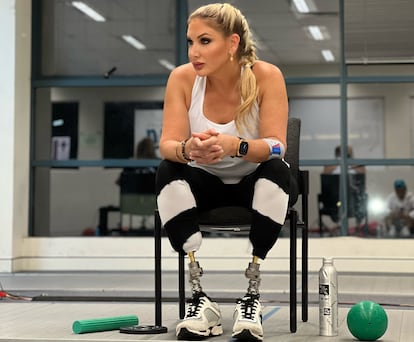The dramatic story of a malaria survivor: Two weeks in a coma, 47 operations and both legs amputated
Australian entrepreneur Stephenie Rodriguez contracted the disease in Nigeria. After a long recovery, she is speaking out about her experience and calling for more funds to eradicate this disease, which kills 600,000 people every year


A work trip to Nigeria changed Stephenie Rodriguez’s life. In September 2019, the Australian entrepreneur traveled to the African country to give a talk about an app her company Wonder Safe had just launched that was focused on providing security for women and vulnerable people. Her plan was simple: she would take an Uber to the hotel and another Uber to the conference room. But she believes that while leaving the hotel, as she stopped briefly to speak with journalists, a mosquito bit her left ankle three times. That was all it took. Two weeks later, she started experiencing symptoms and was diagnosed with cerebral malaria.
Malaria is one of the so-called neglected tropical diseases (NTDs). It is potentially fatal and is contracted when bitten by a mosquito infected with the Plasmodium parasite, common in tropical regions of Africa, as well as in Asia and Latin America. The latest report on this disease published by the World Health Organization (WHO) states that 249 million cases were recorded worldwide in 2022, 16 million more than the 233 million recorded in 2019, before the Covid pandemic. Malaria kills 600,000 people each year, mostly African children under five years of age.
Rodriguez had a seizure while flying from Sydney, Australia to Boston, in the United States, just 15 days after her stay in Nigeria. “They took me to the hospital by ambulance and in the ICU they diagnosed me with cerebral malaria,” she recalls in a video call interview from her home in Sydney.
The work trip was not her first time in Africa, she had been to Kenya before and, in that instance, she took antimalarial treatment. On her trip to Nigeria, however, she decided to do without it. Malarone is the medication that prevents and treats malaria by eliminating the parasite that causes it, although it can have adverse effects such as fever, diarrhea, nausea or vomiting, among others. It caused Rodriguez “dizziness and hallucinations.” “I was going to give a conference, I couldn’t let myself get sick. I didn’t go out for a walk, I didn’t go to the pool, I was only outside for a moment to meet with journalists. A decisive moment, which was all it took,” says the Australian.
After the seizure, Rodriguez spent two weeks in a coma. When she woke up, she was completely paralyzed. It took her 55 days to recover and be taken off dialysis — a treatment that takes over the kidneys’ functions — and catch a plane back home. “I got infected on September 11, woke up from the coma on October 11, and didn’t return to Australia until November 5,” she says. Even so, she insists that she is lucky because she was treated at Harvard University Hospital. “Surely anywhere else, I wouldn’t have received the same level of care in order to diagnose malaria in time and give me the cure that would save my life,” Rodriguez adds.
A constant pain
Although her life was no longer in danger, after coming out of the coma, her toes began to turn black. “My heels were also turning dark, as were the tips of my hands. Those areas were paralyzed because my body had atrophied during the coma and the medications they gave me to treat septic shock ended up damaging them completely,” explains Rodriguez. Three months after returning to Australia, in February 2020, she underwent the first amputations on her feet and heels. Finally, on March 31, 2021, and after 47 operations, both of her legs were amputated below the knee. “It was never going to heal, nor regenerate, and it was the only way out of the constant pain,” she says.
As a malaria survivor, Rodriguez is trying to raise awareness about the disease. She has set herself the challenge of impacting a billion lives by 2025, an action she is carrying out in collaboration with The Global Fund, an international organization aimed at accelerating the end of the AIDS, tuberculosis and malaria epidemics. “I have had a very hard time, especially during the Covid-19 pandemic, but overcoming malaria and always looking for the positive side has allowed me to look at ways to create a new life in this adapted body,” she says.
Two years ago, she started fencing. “I had to keep myself active. I used to dance salsa, ski, ride a bike…” With fencing, the businesswoman found a way to keep busy, fit and, ultimately, alive. She currently trains at a high level and takes part in competitions for people with disabilities: she even spent 14 months training to qualify for the Paralympic Games, although she did not succeed. “Through this experience, I have managed to feel a deep respect for people living with disabilities. If I hadn’t had this experience, I would never have been able to understand it,” Rodriguez admits.
She has been able to move on with her life, but warns that “malaria continues to kill.” “The mosquito doesn’t care what color you are, it bites and kills just the same,” Rodriguez warns. Malaria is very dependent on the climate. Mosquitoes of the genus Anopheles, which transmit malaria, benefit from extreme heat. According to the WHO, in the last half century the world has warmed by approximately 0.75ºC and during the last 25 years, the process has accelerated, adding up to 0.18ºC per decade. The African continent accounts for 94% of the world’s malaria cases and 95% of malaria deaths. Every minute, a child under five dies from malaria in Africa.
“We are not paying enough attention. The pathogen is mutating, and more resources are needed to help eradicate malaria. I firmly believe that it can be exterminated with tools, resources and a vaccine,” says Rodriguez, who is calling for international unity to obtain more money for research. The Global Fund estimates that $3.8 billion is needed in funding to eradicate malaria.
Most of Rodriguez’s family is Puerto Rican, and the rest live in the United States. “It’s been difficult to get through the whole process away from them,” she confesses. Even so, she is happy and proud to always have her son by her side. The Australian is a single mother and when she contracted malaria, “her little one,” who is now 18, was a 13-year-old teenager. “At that time, I didn’t see myself capable of being a mother,” she admits. Rodriguez praises her son for giving her the strength and support she needed in her long, painful and slow recovery. She will never forget his words when she woke up from the coma. “I was just crying, and my son told me that life is 10% what you’re given and 90% what you do with it.” Five years later, that continues to be the fencer’s motto and thanks to it, she says, she can face every day.
Sign up for our weekly newsletter to get more English-language news coverage from EL PAÍS USA Edition
Tu suscripción se está usando en otro dispositivo
¿Quieres añadir otro usuario a tu suscripción?
Si continúas leyendo en este dispositivo, no se podrá leer en el otro.
FlechaTu suscripción se está usando en otro dispositivo y solo puedes acceder a EL PAÍS desde un dispositivo a la vez.
Si quieres compartir tu cuenta, cambia tu suscripción a la modalidad Premium, así podrás añadir otro usuario. Cada uno accederá con su propia cuenta de email, lo que os permitirá personalizar vuestra experiencia en EL PAÍS.
¿Tienes una suscripción de empresa? Accede aquí para contratar más cuentas.
En el caso de no saber quién está usando tu cuenta, te recomendamos cambiar tu contraseña aquí.
Si decides continuar compartiendo tu cuenta, este mensaje se mostrará en tu dispositivo y en el de la otra persona que está usando tu cuenta de forma indefinida, afectando a tu experiencia de lectura. Puedes consultar aquí los términos y condiciones de la suscripción digital.








































